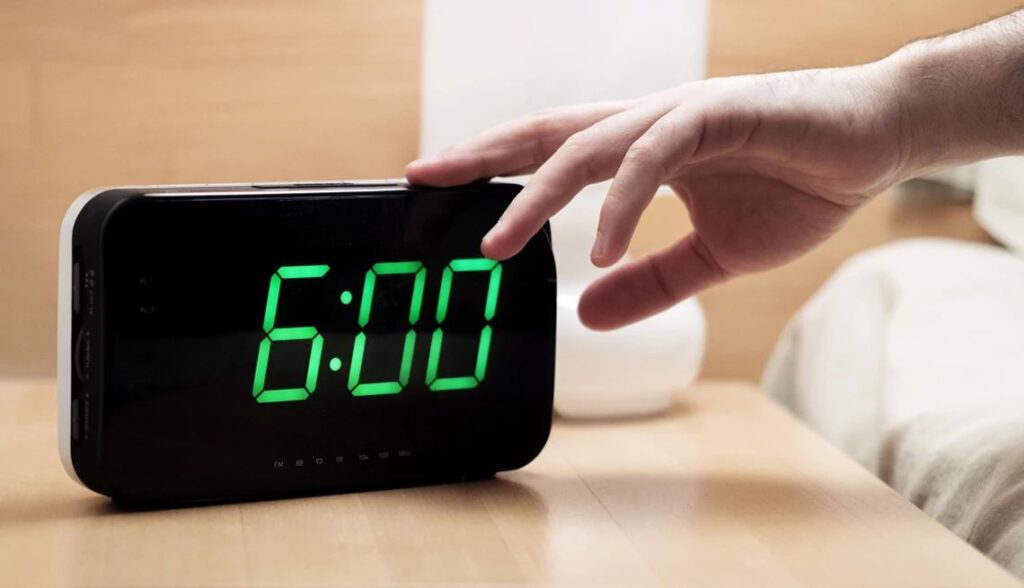Is the Snooze Button Ruining Your Sleep?

The snooze button should be charged with false advertising: It sells us more sleep and a brighter day but often delivers worse sleep and a drowsier day. Still, we fall for it. According to one survey of 20,000 people who wore an activity-tracking watch, 50 percent hit snooze at least once every morning.
“Hitting snooze can be harmful, because the sleep you get between alarms is usually fragmented and low-quality. Instead of getting restful sleep, you’re dipping into lighter sleep stages, which can make you feel even groggier when you finally get up,” says Shelby Harris, a licensed clinical psychologist and director of sleep health at Sleepopolis. “Over time, this can lead to poor sleep hygiene and feeling more daytime sleepiness, which can have a negative impact on your overall health and energy levels.”
That’s why she and other sleep experts tend to encourage people to skip the snooze and just set the alarm for the time they actually need to get up. “If you do the math, you see, wow, because I am getting my alarms to go off for two hours, that shorts me on two hours of sleep,” says Alicia Roth, a clinical health psychologist at the Cleveland Clinic.
But breaking any habit is hard — especially one that’s performed while half-asleep. Here’s what pros recommend.
1. Understand your body’s needs
Not everyone needs to disrupt their snooze button routine. One 2023 study in the Journal of Sleep Research, for instance, found that the people drawn to snoozing tend to be younger or have later chronotypes, meaning they’re most alert later in the day. For them, snoozing doesn’t seem so harmful — only resulting in about six minutes of lost sleep, with no clear impact on morning sleepiness or mood.
Snoozing may even be beneficial in this group, the study authors write, since it can help overcome sleep inertia, or that disorienting, groggy period right after waking that makes rousing feel impossible. “Sleep inertia is this physical feeling of ‘I can’t physically get up,’ ” Roth says. “It’s not laziness. It’s not because you’re not motivated.” Typically, it passes in 30 to 60 minutes.
2. Improve your sleep hygiene
If you keep hitting snooze because you don’t feel rested enough — rather than as the occasional bridge between sleeping and waking — start by evaluating your sleep hygiene, or the habits that promote good sleep, says Jocelyn Y. Cheng, M.D., a neurologist who specializes in sleep medicine and epilepsy.
For instance, a checklist from Harvard’s Stress and Development Lab recommends that you try to avoid screens for at least 30 minutes before bed, reserve the bedroom for the three S’s (sleep, sex and sickness), maintain the same bed and wake-up times, sleep in cool and dark conditions, and eliminate caffeine and alcohol at least four hours before bed.
Cheng also suggests trying to get some sunshine right away. “Exposing yourself to bright light in the morning is … a natural signal for your brain to wake up.” As your sleep hygiene improves, the allure of the snooze button should diminish.
3. Consider the cause
If you’re occasionally snoozing because you enjoy a little extra window to wake up, it’s not necessarily something you have to change. “If you’re not in a rush and need a little extra time to wake up slowly, hitting snooze might help you mentally prepare for the day,” Harris says. “But it’s more of a temporary mental boost and shouldn’t be something you rely on all the time.”
But if you’re snoozing on repeat because you’re utterly exhausted when the rooster crows, there’s more to investigate. Maybe you’re not sleeping long enough and should prioritize getting to bed earlier (or setting the alarm for later, if possible). Maybe your sleep quality is lackluster, which could mean you should brush up on your sleep hygiene. Or maybe you have an undiagnosed sleep disorder like sleep apnea, which can interrupt your sleep without you even knowing.
“Sleep inertia in general, if you feel like it’s starting to interfere with your life, then that’s the time to talk to a doctor,” Roth says. “If you’re consistently missing work, missing school, getting there late — that’s a time to speak with a doctor or a sleep specialist.”
Pinpointing an underlying cause isn’t only important for your day-to-day-functioning; it can also affect your longer-term health and Alzheimer’s risk, says Cheng, vice chair of the American Academy of Sleep Medicine’s Public Safety Committee.
To read about more ways that hitting snooze can be bad for you, from AARP, CLICK HERE.
